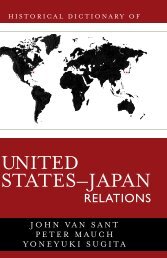Private Academies of Chinese Learning in Meiji Japan: The Decline ...
Private Academies of Chinese Learning in Meiji Japan: The Decline ...
Private Academies of Chinese Learning in Meiji Japan: The Decline ...
You also want an ePaper? Increase the reach of your titles
YUMPU automatically turns print PDFs into web optimized ePapers that Google loves.
PRIVATE ACADEMIES OF CHINESE LEARNING IN MEIJI JAPAN 679) Students must on no account stay the night elsewhere;if someone is taken ill at their dest<strong>in</strong>ation or if someth<strong>in</strong>goccurs concern<strong>in</strong>g their next <strong>of</strong> k<strong>in</strong> which makes it hard toleave and the student stays one night, he has to report thisfrom his dest<strong>in</strong>ation. Also, if there is some doubt, thecircumstances will be <strong>in</strong>vestigated and directions given. If ithas been reported <strong>in</strong> advance that the student will stay thenight, these limitations do not apply.10) With<strong>in</strong> the juku the use <strong>of</strong> alcohol is strictly banned.Apart from that it is not allowed to urge others to go outtogether to dr<strong>in</strong>k and buy women.11) It goes without say<strong>in</strong>g that crowd<strong>in</strong>g together wassometh<strong>in</strong>g the sages were concerned about; students mustalways restra<strong>in</strong> themselves with regard to obscene talk,vulgar songs and other th<strong>in</strong>gs. Also it is <strong>in</strong>considerate todiscuss <strong>in</strong> loud voices and throughout the night themean<strong>in</strong>g <strong>of</strong> the classics, political measures, military strategyand other affairs. <strong>The</strong> above paragraphs have to be agreedto on enter<strong>in</strong>g the juku. 9Students had considerable freedom to pursue their own studiesand were not bound by any particular school <strong>of</strong> Confucianism,previous masters or Sokken’s own views. 10 <strong>The</strong>y wereencouraged to voice their own ideas. It appears that Sokken’sown experience <strong>of</strong> study <strong>in</strong>fluenced the way he ran his juku; hehimself had been largely self-taught before he went to theShōheikō. <strong>The</strong> runn<strong>in</strong>g <strong>of</strong> the juku was also <strong>in</strong>formal, no jukutō[prefect] was appo<strong>in</strong>ted; four or five suitable students werechosen to keep th<strong>in</strong>gs <strong>in</strong> order.Little is known about the early years <strong>of</strong> the juku, <strong>in</strong>clud<strong>in</strong>gstudents. Lists <strong>of</strong> students exist from 1859, when Sokken drew uprecords <strong>of</strong> his associates and his disciples from memory. Hisbiographer states that they <strong>in</strong>clude about 60 or 70 per cent <strong>of</strong> thestudents; 11 <strong>of</strong> 188 names <strong>of</strong> students listed, 59 are for the year1859. <strong>The</strong>y came from all over <strong>Japan</strong> and <strong>in</strong>cluded men who laterbecame famous, like Nakamura Masanao (1832–90) and ShigenoYasutsugu (1827–1910). Sometimes <strong>in</strong>formation on the students’background is <strong>in</strong>cluded, such as vassal <strong>of</strong> a doma<strong>in</strong>, physician,merchant or <strong>of</strong>ficial<strong>of</strong> the shogunate. Most <strong>of</strong> them appear tohave been samurai, and a significant number came fromSokken’s home district. For 1860–61, 119 students are listed, for1862 the number is 52. For 1863 only 14 names are listed and for













